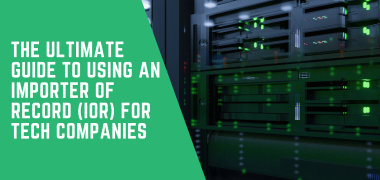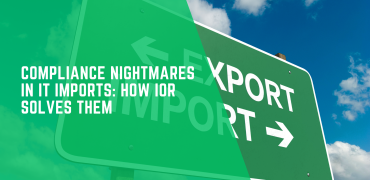Expanding your tech company internationally is an exciting milestone, but it can also come with a maze of regulatory hurdles, especially when it comes to importing high-value IT and telecom equipment. Companies in these sectors often face unique challenges, from complex compliance requirements to navigating customs duties. Enter the Importer of Record (IOR) – a service provider that takes on the legal and administrative responsibilities of importing goods on behalf of your company.
In this guide, we’ll walk you through everything you need to know about IORs, including why your tech company needs one and how the right IOR partner can help you avoid costly errors, delays, and compliance headaches.
What is an Importer of Record (IOR)?
An Importer of Record is a legal entity responsible for ensuring imported goods comply with all local regulations, including duties, taxes, and documentation. Essentially, an IOR handles all import-related formalities on behalf of your company, saving you from having to set up a legal presence in every country where you want to import.
For tech companies importing complex equipment like servers, networking hardware, and telecom devices, an IOR provides peace of mind by managing everything from regulatory compliance to customs clearance.
Key Responsibilities of an IOR:
- Customs Compliance: Ensuring the imported goods comply with local laws, including obtaining necessary certifications.
- Documentation: Handling the paperwork, licenses, and permits required for customs clearance.
- Duties and Taxes: Paying all import duties, VAT, and other taxes, and ensuring proper documentation for future audits.
- Risk Management: Taking responsibility for any legal issues related to importing goods.
Why Tech Companies Need an Importer of Record
Tech companies, especially in IT and telecom, face unique import challenges that make using an IOR invaluable. Here’s why:
1. Complex Compliance Requirements
- Example: Countries like the U.S., Canada, and EU member states have specific regulations governing the import of telecom and IT equipment. You may need specialized certifications, like FCC approval in the U.S., to avoid delays.
- An IOR understands these requirements and ensures your equipment meets all necessary certifications and standards.
2. Avoiding Costly Fines and Penalties
- Non-compliance with import laws can lead to hefty fines and legal repercussions. For tech companies with high-value equipment, a compliance error can be costly.
- Case in Point: A telecom company attempting to import equipment into the EU without an IOR might miss critical regulatory steps, resulting in penalties and even seizure of goods. An IOR helps avoid these issues.
3. Seamless Global Expansion
- Setting up a legal entity in every country where you want to import goods is costly and time-consuming. An IOR provides a simpler, more affordable solution.
- With an IOR, you can expand your operations in multiple countries without establishing an in-country presence, saving money and resources.
How an IOR Can Save Your Company Millions
Partnering with the right IOR can help tech companies save significant time and money. Here’s how:
1. Minimizing Customs Delays
- Delays at customs can disrupt your supply chain, leading to costly downtime, particularly for telecom companies needing critical equipment quickly.
- IOR Advantage: With the right documentation and compliance handled, an IOR can streamline customs processes, reducing clearance times.
2. Avoiding Costly Mistakes and Fines
- Mislabeling products, incorrect documentation, or misunderstanding import requirements can result in fines or seizure of goods.
- Real-World Example: A tech company importing sensitive equipment into Brazil might face unique regulations. A specialized IOR will ensure that all requirements are met, preventing avoidable penalties.
3. Accurate Duty and Tax Calculations
- Customs duties and taxes can be complicated, varying by country, product type, and even end use. Miscalculations lead to overpayments or penalties.
- IOR Benefit: Your IOR calculates duties and taxes accurately and ensures all fees are paid upfront, saving your company from potential financial losses.
4. Managing Documentation and Record-Keeping
- Tech companies often import high-value equipment that requires meticulous record-keeping for future audits.
- An IOR maintains comprehensive records of all imports, ensuring that you’re prepared for any compliance reviews. This not only prevents potential fines but also makes audits smoother and less time-consuming.
5. Protecting Intellectual Property
- Some countries have strict rules about importing encrypted equipment, which is common in IT and telecom sectors. An experienced IOR knows how to navigate these rules, helping protect your intellectual property.
Challenges Tech Companies Face Without an IOR
Without an IOR, tech companies are exposed to a range of risks, from compliance failures to logistical roadblocks. Here’s what can happen:
1. Unexpected Costs Due to Non-Compliance
- Regulatory compliance is especially critical in the telecom and IT sectors, where importing unapproved equipment can result in penalties and the need for expensive modifications.
2. Increased Risk of Shipment Delays
- Customs officials often scrutinize telecom and IT hardware due to security and compliance concerns. Without an IOR to streamline documentation and liaise with customs, shipments may face prolonged delays.
3. Liability for Non-Compliance
- In many countries, failure to comply with import regulations can result in severe legal repercussions. Without an IOR, tech companies may bear full liability for any regulatory breaches.
How to Choose the Right Importer of Record for Your Tech Company
Selecting the right IOR is crucial. Here are factors to consider when choosing your IOR partner:
1. Industry-Specific Expertise
- Look for an IOR with experience in the tech and telecom sectors. They should be familiar with the regulatory nuances of importing high-tech and telecom equipment, such as specific labeling and encryption requirements.
2. Global Reach and Local Knowledge
- Ensure the IOR has a network of agents in the countries where you plan to import goods. Their local knowledge can expedite customs processes and help you avoid regional pitfalls.
3. Compliance Track Record
- Ask for case studies or references that showcase the IOR’s track record of compliance. A proven history of successfully navigating regulatory requirements is essential.
4. Transparency in Costs
- Hidden fees can erode the cost-saving benefits of an IOR. Choose a partner who is transparent about pricing and can provide a breakdown of all costs, including duties, taxes, and service fees.
5. Robust Documentation and Record-Keeping Systems
- Look for an IOR with strong data management practices to ensure that all documents are meticulously kept for future audits and compliance reviews.
IOR Success Story: How ASL Helped a Telecom Giant Save Millions
To illustrate the value of an IOR, consider this case study:
Challenge: A multinational telecom company wanted to expand operations across Europe but faced challenges with local regulatory compliance, particularly with import licenses and certifications for network equipment.
Solution: They partnered with ASL as their IOR, leveraging its extensive expertise in telecom import regulations.
Results:
- Cost Savings: By managing import taxes and duties effectively, ASL helped the client avoid unnecessary costs, saving approximately $1.5 million annually.
- Faster Importation: The company saw a 40% reduction in customs delays due to improved documentation and compliance.
- Compliance Assurance: With an IOR managing regulatory paperwork, the client was fully compliant with local regulations, avoiding fines and enhancing their reputation as a trusted telecom provider.
Key Takeaways for Tech Companies Considering an IOR
- Understand Your Needs: Assess the scope of your import requirements, including the countries involved and the types of equipment you’ll be importing.
- Choose Wisely: Not all IORs are created equal – opt for a provider with expertise in your industry and a transparent pricing model.
- Prepare for Compliance: Work closely with your IOR to stay on top of ever-changing regulations and avoid costly mistakes.
Conclusion
For tech and telecom companies, partnering with an Importer of Record can transform the complex process of global expansion into a streamlined operation, allowing your company to enter new markets confidently and cost-effectively. By managing compliance, documentation, and tax calculations, an IOR enables you to focus on what you do best: innovating and growing your business.
With the right IOR partner, you’ll not only avoid costly import errors but also gain a strategic advantage in today’s highly competitive global market. Investing in an IOR is more than just a logistical decision – it’s a smart move for sustainable, compliant growth.




